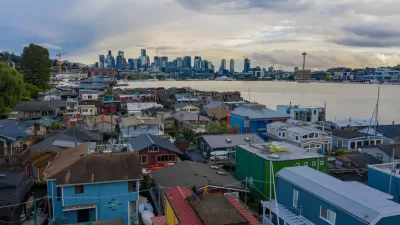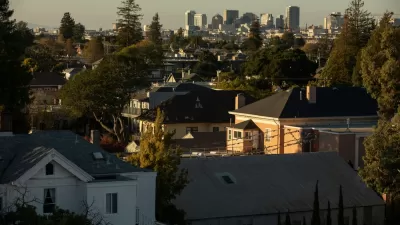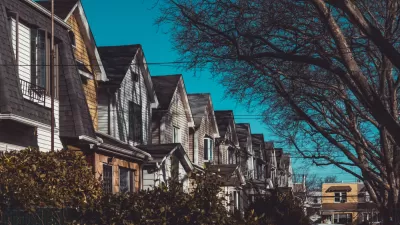The historically comprehensive study outlines the policies that have shaped homeownership, generational wealth, and economic development in the Puget Sound region.

A new report from the Puget Sound Regional Council (PSRC) connects single-family zoning to structural racism in the region, reports Shaun Kuo in The Urbanist.
Unlike previous studies of the issue, Kuo notes, the Legacy of Structural Racism Interactive Report “provides a high-level overview and collection of resources on this history of structural racism in the Puget Sound region. It is also authored by a government agency that is key to the long-range land use, transportation, and economic planning of the Puget Sound region and is empowered with the distribution of federal funding.”
The report outlines the region’s history dating back to the 1700s, highlighting the removal of Native Americans, the expulsion of Chinese people, and other racially motivated events in the area’s history up to and including 20th century redlining and its lingering modern-day effects.
“This report does much to pair the historic suppression of nonwhite wealth building with the retention of land use policies that increase the cost of homeownership. It demonstrates the legacy of these practices in the massive wealth gap between White and Black households, wherein for every dollar a White family has, a Black family has a little more than 10 cents.”
The report also notes the impact of highway construction on primarily poor and non-white neighborhoods. “PSRC’s report discusses how whiter and wealthier neighborhoods like Mercer Island were able to get highway lids and public parks to mitigate highway construction. Meanwhile, neighborhoods like the Chinatown-International District were denied mitigation.”
See Kuo’s article for more details and a link to the full report.
FULL STORY: PSRC Report Connects Single Family Zoning and Highways with Structural Racism

Alabama: Trump Terminates Settlements for Black Communities Harmed By Raw Sewage
Trump deemed the landmark civil rights agreement “illegal DEI and environmental justice policy.”

Planetizen Federal Action Tracker
A weekly monitor of how Trump’s orders and actions are impacting planners and planning in America.

The 120 Year Old Tiny Home Villages That Sheltered San Francisco’s Earthquake Refugees
More than a century ago, San Francisco mobilized to house thousands of residents displaced by the 1906 earthquake. Could their strategy offer a model for the present?

In Both Crashes and Crime, Public Transportation is Far Safer than Driving
Contrary to popular assumptions, public transportation has far lower crash and crime rates than automobile travel. For safer communities, improve and encourage transit travel.

Report: Zoning Reforms Should Complement Nashville’s Ambitious Transit Plan
Without reform, restrictive zoning codes will limit the impact of the city’s planned transit expansion and could exclude some of the residents who depend on transit the most.

Judge Orders Release of Frozen IRA, IIJA Funding
The decision is a victory for environmental groups who charged that freezing funds for critical infrastructure and disaster response programs caused “real and irreparable harm” to communities.
Urban Design for Planners 1: Software Tools
This six-course series explores essential urban design concepts using open source software and equips planners with the tools they need to participate fully in the urban design process.
Planning for Universal Design
Learn the tools for implementing Universal Design in planning regulations.
Clanton & Associates, Inc.
Jessamine County Fiscal Court
Institute for Housing and Urban Development Studies (IHS)
City of Grandview
Harvard GSD Executive Education
Toledo-Lucas County Plan Commissions
Salt Lake City
NYU Wagner Graduate School of Public Service





























